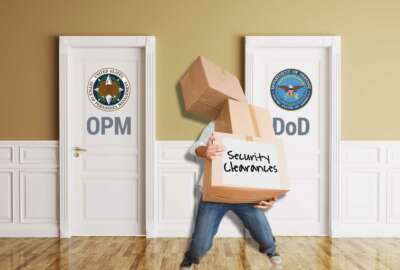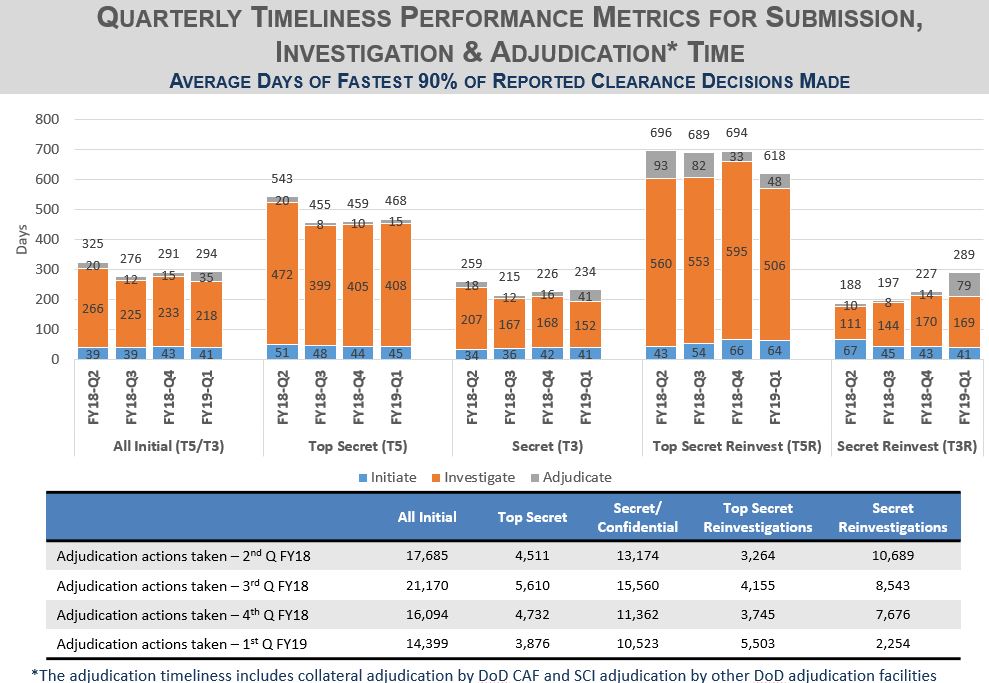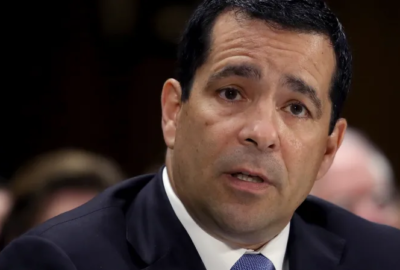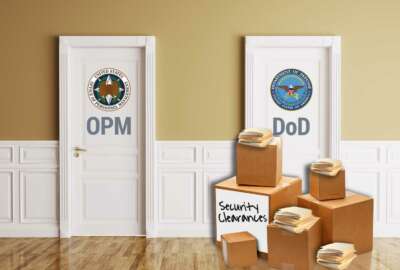
As NBIB shrinks the security clearance backlog, other personnel vetting agencies feel the pressure
The backlog of pending security clearances and other matters at the National Background Investigations Bureau (NBIB) is down more than 25 percent from its...
As the Office of Personnel Management’s National Background Investigations Bureau (NBIB) continues to cut down its inventory of pending security clearances and other matters, progress is putting more pressure on other entities within the governmentwide personnel vetting system.
NBIB is in a much different place than it was nearly a year ago now, when it faced a sky-high backlog of 725,000 pending security clearances and other investigations.
Today, the backlog of pending investigative matters stands at 542,000, Charlie Phalen, NBIB’s director, told a group of federal employees and industry members who sit on the National Industrial Security Program Policy Advisory Committee (NISPPAC).
The NISPPAC recommends changes to industrial security policy and consists of agency and industry members who are most impacted by these policies, including federal employees and contractors who serve the Defense Department, Office of the Director of National Intelligence, Energy Department and others.
About 103,000 federal employees and contractors who are still waiting for an initial background investigation are currently at work and operating under an interim security clearance, Phalen said.
In industry alone, 37,000 people are waiting for an initial Tier 3 investigation, while 25,000 industry members are waiting for a top secret clearance, Phalen said.
NBIB has spent the past year finding ways to streamline the background investigation process and modernize some of the more manual, labor intensive steps that 21st century technology could easily shorten. The agency is exploring the use of artificial intelligence in the security clearance process. Through those efforts, NBIB has cut the number of hours its investigators need in the field to complete an investigation by 52 percent.
Though NBIB still isn’t processing security clearances within the timeliness standards set by Congress or by the Performance Accountability Council (PAC), the average time to complete most kinds of investigations is going down.

Phalen prefers to evaluate the median age of pending investigations. The median secret clearance, for example, took 150 days in January compared to the previous year, while the age of the median top secret clearance dropped more than 100 days over the past year.
Pressure on DoD adjudications
But as NBIB moves faster, adjudications agencies will need to move more quickly as well. DoD’s Consolidated Adjudications Facility has a backlog of 52,508 industry investigations.
“Backlogs aren’t gone when the investigations are done,” Ned Fish, director of DoD’s Consolidated Adjudications Facility, said at Wednesday’s NISPPAC meeting. “All cases that are investigated must be adjudicated, so we’re in a bit of a fight these days. I think it’s no surprise to you all. We’ll be in a bit of a fight for another year or so, because as NBIB ramps up and surges and pushes cases to us, we’re in the sword fight with them as we’re trying to adjudicate those cases.”
Adjudicating an initial security clearance takes, on average, 37 days at the DoD CAF. Adjudicating periodic reinvestigations takes much longer at an average of 113 days, Fish said.
Adjudications should, at least according to both congressional and PAC timeliness guidelines, take between 20-to-30 days, depending on the clearance level.
As of the second quarter in fiscal 2018, DoD’s CAF adjudicated most initial and top secret clearances within 20 days, according to data provided to the NISPPAC in November 2018.
Fish said DoD’s CAF is prioritizing certain cases, such as initial security clearances, higher-risk periodic reinvestigations and reciprocity requests, over others. Per DoD guidance, the Pentagon is deferring most low-risk reinvestigations into its continuous evaluation program.
“We had some system issues, but right now as of the New Year, we’re ramped up pretty well,” Fish said. “Last week we closed 24,000 cases. A year ago, we were closing about 14,000 cases. We are up-gunning and moving forward.”
DoD’s CAF is trying to surge its resources to better handle its growing workload. Defense Security Service employees are temporarily stepping in to help with adjudication production, and the DoD CAF is reallocating some of its own employees from lower-priority work to help with the organization’s caseload.
Executive order coming … “soon”
Meanwhile, the DoD CAF, along with the Defense Information Systems Agency’s National Background Investigations System (NBIS) program office, are moving to the Defense Security Service. The moves set the stage for the Pentagon to assume responsibility for the entire governmentwide security clearance portfolio.
NBIB and DSS will merge, along with other DoD entities, to create a new organization called Defense Counterintelligence and Security Agency (DCSA), which will handle background investigations for nearly all of government.
Phalen, along with DSS Personnel Vetting Director Tricia Stokes, said both of their organizations have been preparing for months for this merger, which the President must authorize with an executive order.
The Trump administration has been considering this move at least since last April, as Federal News Network reported. Both government and industry officials have said for months the executive order is imminent, but the EO has been delayed.
“The last few times I’ve been here, I’ve promised it’s right around the cusp of being issued,” Phalen said of the pending EO. “That is still just about to happen. I saw a live version of the latest draft and we’re down to a couple of ‘ts’ to cross, and I think it’ll be ready for a signature reasonably soon.”
The merger, however, is still supposed to be official by Oct. 1, 2019. Phalen said the transfer would be “invisible” to industry.
“You see no distinction between the end of September and [Oct. 1],” he said. “It really is a command issue. Over time, the employees of NBIB will become DoD employees as opposed to OPM employees today. But that’s, again, invisible to you all. You should see no change in how you submit things.”
At least one member of industry said Wednesday the pending organizational moves created confusion for contractors who are simply looking for the right person to contact at DSS with their questions.
“I understand your angst,” Tricia Stokes, director of defense vetting at DSS, said. “I feel it. We share it. Every DSS employee and every NBIB employee shares it too. But I will commit to you that where we are going is the right thing for national security. It’s the right thing to get after risk, and it’s the right way we need to vet to a Trusted Workforce 2.0 future.”
Copyright © 2025 Federal News Network. All rights reserved. This website is not intended for users located within the European Economic Area.
Nicole Ogrysko is a reporter for Federal News Network focusing on the federal workforce and federal pay and benefits.
Follow @nogryskoWFED
Related Stories






